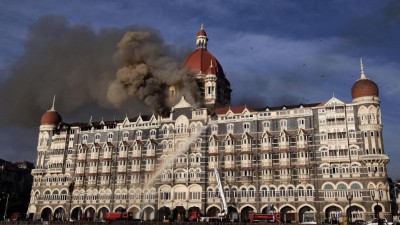By Mahua Venkatesh
New Delhi, Nov 26 : The vivid photographs and video footage of Mumbais iconic Taj Mahal Palace burning or the horrific visuals of death and destruction at the Trident Oberoi, Leopold Café and Chatrapathi Sivaji Terminal Railway station will remain etched on every Indians memory. Indias financial capital, along with the rest of the country, stood still for four days watching the horrific terror attacks carried out by Pakistan-based Lashar-e-Taiba. In the wake of the Mumbai attacks, the contours of security protocol in the hospitality industry and other business premises got changed forever.
Today the level of security protocol maintained by the Indian hospitality sector is unparalleled.
A Reuters report after the terror attack revealed that Indian hotels spent only about 3 per cent of the project cost on building management systems, including security. Countries such as China and the US directed 7-8 per cent of the project cost towards security alone.
That was then. Things have changed today. “India is among the few handful countries today that follow such stringent security protocol, even countries like the US, UK or even Singapore don’t have such intense protocol,” Rahul Pandit, managing director, Hamstede Living and member, CII National Committee on Tourism, told IndiaNarrative.com.
After the 26/11 terror attacks, the Indian hospitality industry, in collaboration with the local administration and police authorities, has been following a rigorous security protocol for their guests, including over 10 million visitors visiting the country.
Hotels have substantially increased their spends on security, which is central to the functioning of these establishments. Today, about 15 per cent of the project costs are directed towards beefing security. Hotels, malls and business establishments have spruced up their investments, significantly towards tightening security and screening. CCTVs, infra-red cameras, walk-in metal detectors and X-ray machines are now common at every high and mid segment hotel. A few hotels including the mid-segment Lemon Tree chain of hotels in the capital even has a facial recognition system
Every inch of the common areas, including the room corridors, where only the in-house guests have access to, are now monitored 24/7.
A detailed know-your-customer (KYC) as well as know your employee norms are diligently followed by the hotels—irrespective of their category and locations—to avoid recurrence of the 26/11 incident.
“The 26/11 terror attacks have changed the way a hotel functions. There is intense security at all hotels throughout the country and even outside. There are CCTVs and guests are kept under watch,” said Meena Bhatia, vice-president, marketing and operations, Le Meridien said.
Bhatia said that all Indian rated hotels are equipped to handle any terror attacks.
Non-premium hotels and many that are located outside the metros too have put in place an unparalleled security exercise.
So today, when you walk into a hotel premise either for a leisurely stay or even for a meal, remember that every move of yours is being watched. But it is for your safety.
(This content is being carried under an arrangement with indianarrative.com)
Disclaimer: This story is auto-generated from IANS service.

